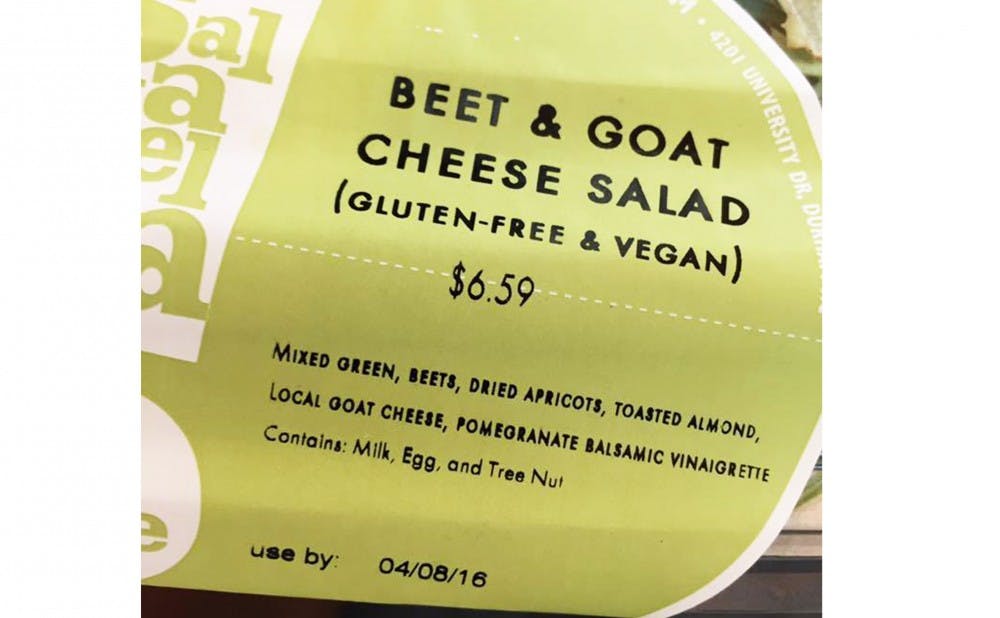The inaccurate dietary labeling of food options on campus has become a widespread problem this year.
Junior Courtney Scoufis—co-director of Fix My Campus, a Facebook page that allows students to express concerns about campus problems and connects them to student action groups, staff and administrators—said that the organization received an average of two posts a week about food labeling concerns during the 2015-16 academic year.
“I’ve been on Fix My Campus for two years now, and I think this year in particular we’ve received a lot of complaints,” she said.
However, a rise in the number of complaints in Fix My Campus does not necessarily indicate that inaccurate dietary labeling has just now become a problem, she said. She noted that she believes the labeling situation on campus has actually improved significantly, but that it is becoming a greater priority because students are speaking up about it.
“If students don’t reach out, then [vendors] might go completely unaccountable, and that can be a very dangerous situation,” she said.
Junior Savannah Lynn expressed her concern in Fix My Campus after recognizing that a salad in Von der Heyden Pavilion should not have been labeled vegan because it contained goat cheese.
Lynn said that although she understands that mistakes happen, consistently labeling on-campus food options accurately is a necessity.
“I’ve been a vegetarian for so long, and after a while, it’s hard for your body to regain the ability to digest animal and meat products,” she said.
Robert Coffey, director of dining services, also acknowledged the need for correct labeling. He explained that Duke Dining oversees a quality assurance program of unannounced inspections and “mystery” shoppers made up of Duke students, faculty and staff to check on all on-campus operations multiple times a semester.
“We take [our customers’] safety very seriously,” Coffey wrote in an email. “It is of course vitally important that labeling for those with food allergies and intolerances is accurate.”
Lynn also noted she once had to call Duke Emergency Medical Services for a friend because of a dietary restriction issue.
She said she believes such incidents could be more easily prevented if a singular source of nutrition facts and ingredient information for all food options on campus was available.
According to Coffey, Duke Dining recently partnered with a web-based food management and nutrition system called CBORD that will serve this purpose.
He explained that the system will provide customers all Duke Dining on-campus operations with menus, ingredients, allergen information and lifestyle information—including vegan, vegetarian, local, organic and several others—with the option of filtering online menu items by any of these preferences.
Lauren Forman, Trinity ’16, said that because Duke Dining is able to provide ingredient lists and lifestyle classifications for all on-campus food options, she expects labels to be completely accurate.
Forman—who noticed that a non-vegan soup that had been mislabeled once before on the Penn Pavilion menu was still mislabeled a month later—noted that even though she is not vegan or vegetarian, she would rather vendors claim they cannot guarantee a particular food option’s classification than incorrectly identify it.
“It think it’s particularly an issue when others take full confidence in those labels who have dietary restrictions,” Forman said.
She said that although correct labeling of vegan and vegetarian products is commonly considered a “first-world problem,” she thinks that it is principally important for labels to be correct because professionals are being paid to perform this work and parents are paying for their children to be able to choose from correctly labeled food options.
Scoufis noted that all complaints from Fix My Campus are used to create workable objectives in an online spreadsheet that members of FMC focus on.
Fix My Campus has a member assigned specifically to dining, who establishes necessary relationships and contacts to fix the problems noted by students, she explained.
Coffey wrote that Duke Dining and the Duke University Student Dining Advisory Committee appreciate having Fix My Campus as another avenue for customer feedback to help monitor concerns and compliments at Duke Dining locations.
He noted that he encourages students to meet with managers at dining places they frequent so they have familiar faces to express their feedback and concerns.
“The goal is not to single anyone out, but rather to create an ongoing open dialogue where students feel confident asking for and receiving accurate information and reporting any issues they see,” Coffey wrote.
Get The Chronicle straight to your inbox
Signup for our weekly newsletter. Cancel at any time.

